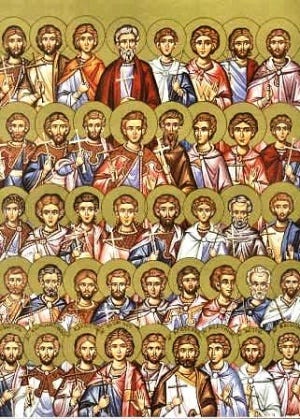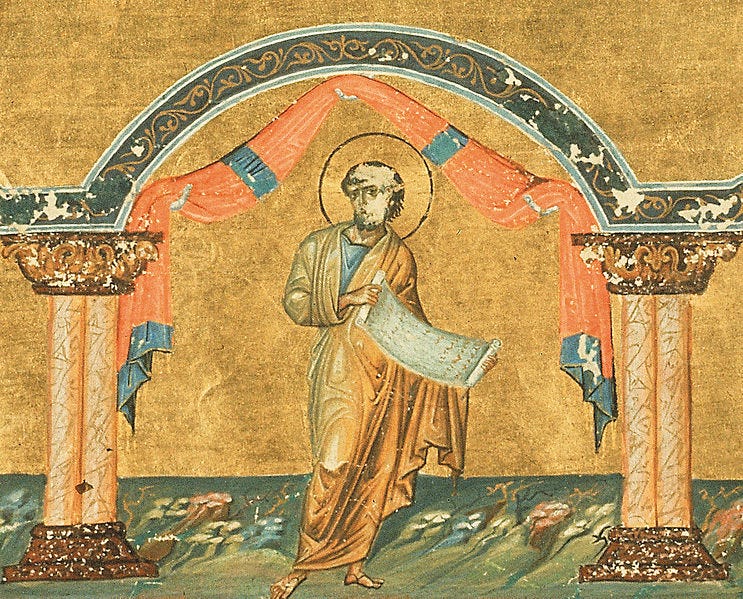Daily Readings | 6 March 25 | Exhortations & Warnings in Jude (20–23)
Scripture Readings: Gen 2:4–19; Prov 3:1–18
Saint/Feast Day: The 42 Martyrs of Amorium
These were soldiers of the Byzantine Emperor Theophilus. The Emperor fought the Muslim Saracens and was defeated, losing the town of Ammoria to them. Many Christians of the town were martyred or sold into slavery. These soldiers were imprisoned where they remained for seven years, nourishing their spirits on the words of the Psalter, and praying the Divine Offices at the prescribed hours. They were urged to deny Christ our God and embrace Islam, but they all refused.
L. Farley, Eastern Saints.
Readings: Gen 2:4–19; Prov 3:1–18
Now that I seem to have recovered from my “cold”—I now believe it was just the shift in weather—let us continue examining the Epistle of Jude.
We just looked at the condemnation of the “godless” in the community with a quotation from the Apostles. Now, Jude shifts to exhortations for the community:
|20| But you, beloved, build yourselves up on your most holy faith; pray in the Holy Spirit; |21| keep yourselves in the love of God; wait for the mercy of our Lord Jesus Christ unto eternal life. |22| And convince some, who [are to be judged/are separated/dispute (διακρινομένους)]; |23| save some, by snatching them out of the fire; on some have mercy with fear, hating even the garment spotted by the flesh.
These verses are some of the most text critically contentious in the NT. We will not delve into the complexities of what is most likely original here, but we will follow the RSV (and the NA28) for evaluating these verses.
An Encouragement (20–21) and a Command (22–23a)
Vv. 17 and 20 have an identical transitional phrase: Ὑμεῖς δέ (humeis de), “But you…” This is a common way an author shifts from one person/subject matter to another. In both vv. 17 and 20, the author is rhetorically signaling a move to another topic.
In v. 17, Jude is addressing the community about how the Apostles predicted these infiltrators when the Church was being established.
In v. 20, Jude is addressing the community directly, expounding on how they are able to keep the Faith.
The topics are reversed from the opening of the letter. V. 17 corresponds with v. 4 and v. 20 with v. 3:
Beloved, being very eager to write to you of our common salvation, I found it necessary to write appealing to you to contend for the faith which was once for all delivered to the saints. (Jude 3)
How is this achieved, per v. 20?
Pray in the Holy Spirit
Abide in the Love of God
Anticipate the mercy of Christ which will lead to Eternal Life
But, that is not all the community is called to do. In v. 22, Jude commands the Church to seek out others who have fallen away. Even though the majority of the letter has condemned the “godless” infiltrators, he has hope of reconciliation.
He goes so far as to beg these early Christians to “save some, by snatching them out of the fire” (v. 23), which resonates with v. 7 (the fires that consumed Sodom and Gomorrah; and potentially v. 11, the followers of Korah [Num 16:35, Sir 45:18–19]—as we discussed previously). Even though some have abandoned the community and attempted to pollute others, Jude leaves open the possibility of their redemption—yet some will still fall away permanently.
This group is ambiguous, though. Does it refer to the “godless” teachers or to those whom they have misled? Jude is not particularly clear here as to which group can be snatched from the “fire.”
If this reference to fire and judgment is akin to that in v. 7, the more positive reading is that those “godless” people who corrupted others—who squandered their Grace and denied the Lordship of Christ (v. 4)—could still repent, be saved, and restored to the Church.
Of Dirty Garments (23b)
Considering how interconnected this letter is and the constant allusions to other OT texts and Jewish tradition, it is hard not to see something lurking underneath the text here:
on some have mercy with fear, hating even the garment spotted by the flesh.
The first part of the verse is fairly straightforward: continue this missional work of saving others from the fires of eternal judgment,—mercy—but approach them with trepidation,—fear—for they might corrupt you in the process.
The second part of the verse that contains
τὸν ἀπὸ τῆς σαρκὸς ἐσπιλωμένον χιτῶνα
The garment stained by the flesh
is tantalizing. What exactly does Jude have in mind? Is it just a coincidental phrase, or is there an appeal to something else here?
First, the word here for “stained” (σπιλόω) is an uncommon word in the NT appearing here and in James 3:6,
And the tongue is a fire. The tongue is an unrighteous world among our members, staining the whole body (σπιλοῦσα ὅλον τὸ σῶμα), setting on fire the cycle of nature, and set on fire by hell.
There may be points of contact here that seem relevant: Staining (obviously), the community, fire/hell.
That said, this is tenuous, and it is better explained by an Early Christian understanding of what corruption can do to the Body of Christ. James and Jude are not dependent on each other for this idea.
In the Septuagint (LXX), the word appears once in Wis 15:4,
But thou, our God, art kind and true,
patient, and ruling all things in mercy.
|2| For even if we sin we are thine, knowing thy power;
but we will not sin, because we know that we are accounted thine.
|3| For to know thee is complete righteousness,
and to know thy power is the root of immortality.
|4| For neither has the evil intent of human art misled us,
nor the fruitless toil of painters,
a figure stained (σπιλωθὲν) with varied colors,
|5| whose appearance arouses yearning in fools,
so that they desire the lifeless form of a dead image.
|6| Lovers of evil things and fit for such objects of hope
are those who either make or desire or worship them.
Although v. 2 is intriguing to contemplate considering sinlessness in 1 John 5:18—which I have discussed—it has no direct application here. Additionally, sin in Wisdom 15 is not relevant considering the stained figure in v. 4 is concerned with idol polemics. This is not the context of Jude,—perhaps it is in 1 John 5:12, “Little children, keep yourselves from idols”—so an appeal to Wisdom is unlikely.
The word also appears once in the Old Testament Pseudepigrapha (OTP)—T.Ash 2.7—but it speaks of a stained soul, not garments, in relation to breaking commandments.
R. Bauckham, 2 Peter, Jude, 116ff. suggests Zech 3:3–4 (MT),
|3| Now Joshua was standing before the angel, clothed with filthy garments (LXX: ἐνδεδυμένος ἱμάτια ῥυπαρὰ). |4| And the angel said to those who were standing before him, “Remove the filthy garments from him.” And to him he said, “Behold, I have taken your iniquity away from you, and I will clothe you with rich apparel.”
The LXX has no lexical parallel here, so we must assume a thematic connection if we are to believe that this is the allusion behind Jude 23b.
What helps solidify this connection comes from Zech 3:2,
And the Lord said to Satan, “The Lord rebuke you, O Satan! The Lord who has chosen Jerusalem rebuke you! Is not this a brand plucked from the fire?”
The phrase “The Lord rebuke you” is quoted in Jude 9 by the Archangel Michael when disputing with Satan over Moses’ body—again, likely dependent on The Assumption of Moses. This, then, could very well be in Jude’s mind when referencing the “filthy garment” since he certainly is familiar with Zech 3:2.
The other resonances with “plucked” and “fire” assuredly seem fitting considering what Jude just requested the community in v. 23. As for a lexical connection with “pluck,” though, there is not one:
ἁρπάζοντες (ἁρπάζω)—Jude 23
ἐξεσπασμένος (ἐκσπάω)—Zech 3:2 LXX
מֻצָּ֥ל—Zech 3:2 MT
But, even if this is in mind, the context of Zechariah 3 does not seem all that relevant other than the potential of redemption. If this passage is in Jude’s mind, it may indicate that although the “godless” have sullied tunics as of now, they may still be redeemed and clothed in fine garments:
“Behold, I have taken your iniquity away from you, and I will clothe you with rich apparel.” (Zech 3:4).
Regardless, that is not apparent, even if it is a nice image—those who are sinful and stained may dress anew in beautiful clothes bereft of excrement.
The directive and warning, though, are clear: when showing mercy to these ones, in an attempt to snatch them from the fire, beware of their carnal sins and temptations.
Concluding Thoughts
The moral of these verses is something that I believe can apply to us all: be merciful to any who fall away from the faith. You never know what impact you might have to draw them back into the Church; no one is forever lost. There is always a chance.
In doing so, be cautious of not falling into sinful ways that may be tempting. Although Jude has something specifically in mind concerning those who departed from the community and tempted others with (sexual) sins, the idea persists and applies even now. We should always be cautious with whom we associate, even in ministerial endeavors.
If you have enjoyed this brief reflection on today’s readings and wish to read more about NT studies, would you kindly like, share this post, and subscribe.







